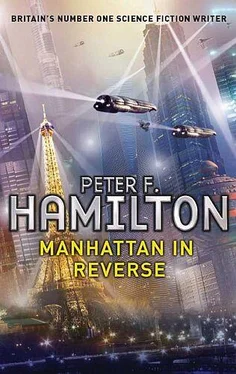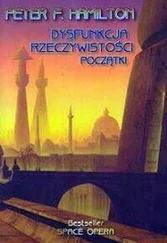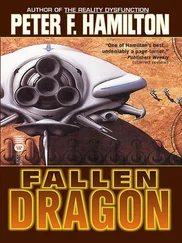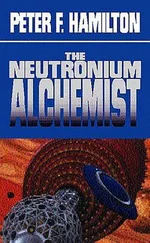‘It’s certainly possible. The existence of carbon 60 has been postulated for a long time; I traced an early reference back to 1815 — it was some very speculative paper on theoretical molecular structures. Justin might have had the idea carbon 60 could be produced by stellar events, and found the spectral signature.’
‘And Alexander, who was a chemist, immediately realized the practical use such a find would have, and killed him for it. Then when a decent interval had passed, in this case, ninety years, he miraculously produces the elusive substance in his lab, to the enormous benefit of his family who have lauded him ever since. Who would possibly suspect any connection with a tragic murder all that time ago? And…’ She gave a start. ‘Alexander never had an air-tight alibi for that night, plus he was working on carbon at the time. Yes, I can see why you’ve invested so much effort into this.’
‘I’ve never been able to find out what Justin was working on,’ I said. ‘Even you said you weren’t sure. But considering the state you were in after his murder, you weren’t even sure what day it was. And you’ve had a long time to reflect on everything he ever said to you.’
‘I’m sorry, Edward, you’ve had a wasted trip.’
‘You don’t know?’ I couldn’t keep the bitterness from my voice. It had been a desperately long shot. But it was the first possible lead I’d got in sixty-seven years.
‘I know exactly what Justin was working on,’ she said sorrowfully. ‘I just didn’t want to tell anyone at the time.’
‘Why?’ I demanded, suddenly furious. ‘Information like that was critical to the investigation.’
‘No it wasn’t. Don’t you understand anything? I loved him, I really did. And he had a crazy theory. He thought there might be life in space. Bacteria that floated through the void like interstellar dust clouds, propelled by solar wind. That’s the spectral signature he was looking for, not carbon 60. He said it was possible all our plagues came from outer space — that was why our immune system always takes time to respond, because each one was new to our planet. He believed all that back in the 1830s. Holy Mary, what a brilliant mind.’
‘But—’
‘Yes I know ,’ she snapped at me. ‘He was right, damnit. He was absolutely right. And I was on the mission which proved it beyond any doubt. We’re convinced the bacterial life we found on Ganymede and Europa originated from space — there’s evidence for it all over the Jovian system. Do you have any idea how painful that was for me after so many years? It’s not an irony, it’s a tragedy. And I can’t tell anybody he thought of it first, because there’s no proof. He’ll never get the credit he deserves, and that’s my fault.’
‘So why didn’t you tell us at the time?’ I asked.
‘To protect his memory. I didn’t want people laughing at my beautiful lover. He was too precious to me for that. I wouldn’t have been able to stand it. And they would have done, the newspapers would have ridiculed him, because it was all too fantastic back then. Invasion of the space flu! I wanted to give him some dignity. He deserved that much.’
I sighed in defeat. She was right, I’d put a lot of hope on her confirming my theory. ‘I don’t suppose I can blame you for protecting him. In fact, I’d probably do the same thing.’
She rested her hand on mine as another little tremor ran through the gallery. ‘What will you do now?’
‘Me? Complete the Kuranda mission, then go home and get on with my life. My changeable life, that is.’
Her heavy, wrinkled cheeks lifted in a melancholy smile. ‘Thank you, Edward. It’s nice to know that someone else cared about him.’
FOUR
RALEIGH FAMILY INSTITUTE AD 1971
The lone oak tree was over two hundred years old, its upper half broken long ago, leaving just an imposing stump to support several sturdy boughs. Rich emerald moss was creeping into the wrinkly bark around the base. I settled down in the cusp of a forking root and looked back down the sloping grassland towards the lake. My FAI shrank to a discreet soap bubble beside my head, emission functions on standby, isolating me from the digital babble of family business. It left my own thoughts free to circulate quietly in my head. It was a lovely day, the sun rising above the valley walls, already warm enough to burn off the dew. Buttercups and daisies starred the thick grass, their tiny petals already fully open, receptive. As always, the vista allowed me considerable serenity.
I made a point of taking a walk around the institute grounds every day, unless the weather was truly awful of course. And it could be on occasion. Climate control was one thing we hadn’t got round to implementing. I was glad about that — there should be some unpredictability in our lives. I suppose that’s why I enjoyed the grounds so much. They were wholly natural. Since I was appointed to the senior family council eight years ago, I’d made damn sure that the only trees planted in the institute valley had been genuine genotypes — same went for the rest of the flora.
A folly, perhaps. But on the rare occasions when anyone questioned me about it, I maintained that it was a valid cultural enclave, and what I was doing was essential preservation. Now that our urban areas were depopulating, everyone wanted to enjoy their own little piece of the rural idyll. Farming had been in a solid decline ever since food synthetics became available at the start of the century. The individual farms which carried on were run by cantankerous old conservationists, or simply families who were determinedly clinging to the old ways. There weren’t many such anachronisms — they didn’t take up much land area, so it didn’t affect the joint council’s overall habitation development strategy. As a result, abandoned farmland right across the country was being reinvented as the kind of pastoral woodland that only ever existed in the most romanticized notions of pre-First Era history. Everybody who left the city wanted their own forest, complete with a glade that had a pool fed by a babbling brook, where their mock First Era villa could be sited. Nobody wanted to wait a hundred years for the trees to grow, so reformatted DNA varieties were the grande fashion, taking just a couple of years to grow sixty or seventy feet, then slowing into a more natural growth model. It struck me as strange, as if our new biononic technology had infected us with different mental patterns; as society matured we were slowly reverting to a Short mentality. Everything had to be now , as if there were no tomorrow rather than the awesome potential future which Bethany Maria Caesar established for us in nineteen sixty-three.
My FAI expanded, chiming melodically. I still used the old interface mode, despite the ease of modern direct sensory linkages. It was, I suspected, a quiet personal admission that Bethany Maria Caesar had been right those many years ago back on Io when she claimed that resistance to evolution was derived from age. None of my great-great-great-great grandchildren had shown any recalcitrance in being fitted with interfaces, nor demonstrated any psychological harm resulting from them. Not that I could hold my own childhood up as any kind of template to the modern world. However, I remained aloof. When you’ve had to upgrade through as many different types of interfaces and operating programs as I have you remain profoundly sceptical as to how long the latest is going to last before it achieves obsolescence. Best you stay with the one you found most comfortable for a few decades.
It was Rebecca Raleigh Stothard’s face which filled the FAI. I might have guessed. There weren’t many people my AI would allow to intrude on my private time. Her holographic image grinned at me, conjuring up a host of most pleasurable memories. Rebecca had undergone DNA reset five years ago, reverting her physiological age to her mid-twenties. She’d been an attractive woman when we had our first dalliance a hundred years ago; now she was simply angelic.
Читать дальше












